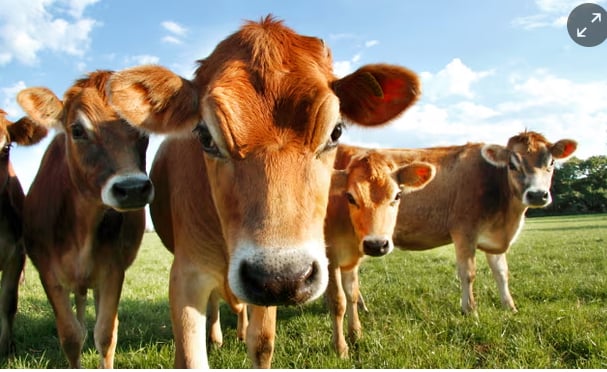December 3, 2025 | 22:04 GMT +7
December 3, 2025 | 22:04 GMT +7
Hotline: 0913.378.918
December 3, 2025 | 22:04 GMT +7
Hotline: 0913.378.918

Bird flu has been detected in some cattle herds and their milk in the US.
Ministers are preparing to introduce legislation that will permit the growing of gene-edited crops in England and Wales. But the new legislation will not cover the use of this technology to create farm animals that have increased resistance to disease or lower carbon footprints.
The decision has dismayed some senior scientists, who had expected both uses of gene editing would be given the go-ahead. They fear the decision could hold back the creation of hardier, healthier herds and flocks. Animal welfare groups have welcomed the move, however.
Gene editing involves making slight changes to plant or animal DNA to create new strains or breeds. The technology has been replacing the techniques of genetic modification (GM), which involve the transfer of entire genes from one species to another and has been strictly regulated by the EU.
The Genetic Technology (Precision Breeding) Act, which approves the use of gene-editing technology, was passed by the previous government. But secondary legislation is needed to implement the law and this was not passed before the general election.
The farming minister, Daniel Zeichner, has since announced the current government would pass that secondary legislation, but only for plants and the food and feed derived from them. “No decision has been taken on bringing forward legislation that enables the Precision Breeding Act for animals,” a spokesperson for the Department for Environment, Food and Rural Affairs said last week.
Scientists working on diseases in animals were critical of this inaction. “This could have a detrimental impact on the research landscape in this country,” said Prof John Hammond, director of research at the Pirbright Institute, near Woking. “In an age of climate change and other threats, we need to be able to make the best use of technologies like gene-editing to improve the lives of animals.”
Prof Helen Sang of the Roslin Institute in Scotland agreed. “With a virulent strain of porcine reproductive and respiratory syndrome wiping out pig herds in Spain, African swine fever on the march north through Europe, and bird flu virus detected in both dairy cattle and their milk in the US, the importance of enabling all potential solutions as soon as possible, including precision breeding, cannot be overstated,” she wrote in a letter to environment ministers.
However, the decision to indefinitely delay the introduction of gene-edited animals was welcomed by Penny Hawkins, head of the RSPCA’s Animals in Science Department. “Every year, about 12% of food from animals is wasted. So it is completely unethical to push animal productivity even further when so much is thrown away already,” she said.
Hawkins added that there was some argument to support the use of gene editing to create species better able to resist diseases. “However, in most cases, diseases are preventable through good housing, husbandry and care and veterinary surveillance. Directly editing animal genomes should be seen as a last resort,” she said. “And what happens if a gene edit proves to be unstable? How will this be detected, and how will these animals be safeguarded and brought back into conditions where they can be properly monitored?”
Other scientists point out that the UK is one of the world’s leaders in the field of gene editing of animal breeds and related technologies. If British researchers are prevented from developing their research then there is a real risk their expertise will wither and the country will lose investment and scientific talent.
“We are creating the opportunities to enhance animal health and welfare, reduce the burden of disease, but we are not creating the opportunity to actually manifest that in the UK – unlike many other countries, such as the US and Brazil,” added Hammond.
“I can see a situation where we export our knowledge but end up having to import the products created from that knowledge.”
Prof Johnathan Napier, the science director at Rothamsted Research in Hertforshire, said that the government’s enthusiasm for plants over animals could be explained – at least partly – by the fact that there were potentially many more gene-edited crops in the pipeline than gene-edited animals. “On the other hand, if you have a technology that could reduce the susceptibility of farmed animals to some pretty unpleasant diseases, why not use it?” he added.
(The Guardian)

(VAN) Landmark SOLAW 2025 report reminds us that resources for food are not infinite.

(VAN) Climate change is a growing concern for agricultural productivity and several studies have focused on how climate variations can impact crop yields.

(VAN) In today's fast-paced society, with people busy with their work and social lives, many dream about quitting the rat race to experience a slower pace of life, which they imagine as being more poetic.

(VAN) Mindanao’s durian industry is reaping the benefits of rising global demand, with farmers now enjoying improved market access, better farmgate prices, and stronger profitability, the Department of Agriculture in Davao Region (DA-11) reported.

(VAN) Iraq is currently grappling with one of the most severe agricultural and livestock crises in its modern history.

(VAN) The Mediterranean and the Black Sea: Fisheries sustainability concerns remain, but overfishing drops to its lowest level in a decade, while aquaculture feeds more people.

(VAN) Cargill Inc has no plans to close its U.S. beef processing plants, days after meatpacker Tyson Foods l opens new tab announced it would shutter a Nebraska facility as industry grapples with cattle supplies.